Email marketing remains a cornerstone of effective customer engagement and business growth in today’s digital landscape. With numerous platforms available, selecting the right one can significantly impact your marketing success. Two prominent players in this arena, HubSpot and Constant Contact, offer distinct approaches to email marketing, each with its own strengths and considerations. Additionally, innovative solutions like Prism Reach are emerging, pushing the boundaries of personalized customer engagement. This article provides a comprehensive comparison of HubSpot and Constant Contact, integrating advanced strategies and highlighting how Prism Reach can elevate your email marketing efforts.
Key Facts
- HubSpot: An all-in-one marketing solution with advanced automation and CRM integration, ideal for medium to large businesses with complex marketing needs.
- Constant Contact: Focuses primarily on email marketing, offering simplicity and affordability, making it suitable for small to medium-sized businesses.
- Both platforms provide email templates, segmentation capabilities, and customer support but differ significantly in depth of features and pricing structures.
Comprehensive Features vs. Streamlined Simplicity: Navigating the HubSpot and Constant Contact Divide
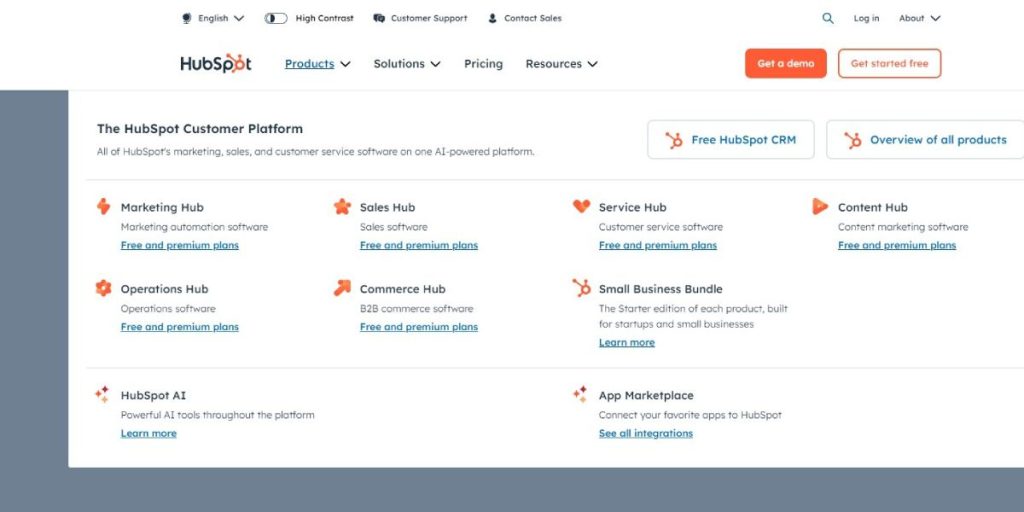
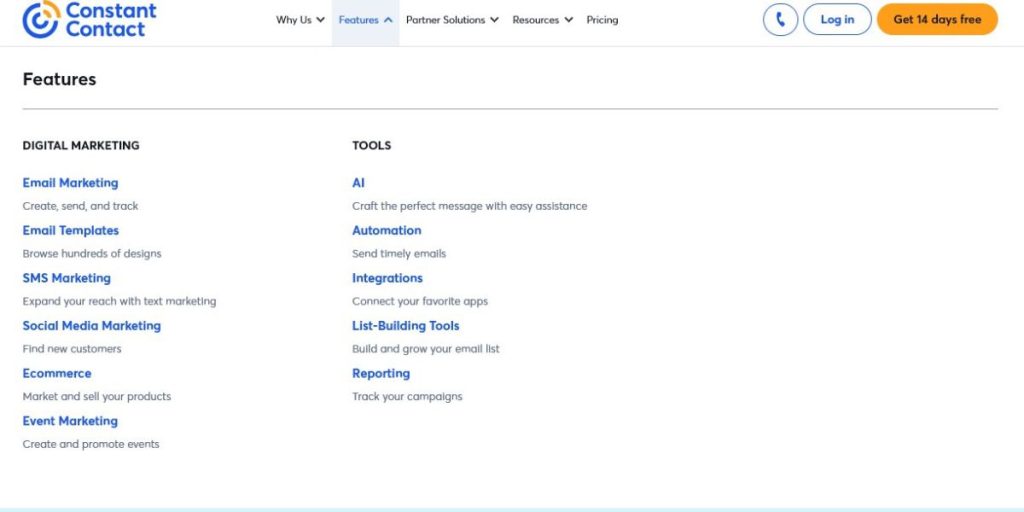
HubSpot: The All-in-One Marketing Powerhouse
HubSpot stands out as a comprehensive marketing platform, integrating email marketing with a full suite of tools including CRM, sales, and customer service functionalities. This integration allows for seamless data flow and advanced automation capabilities.
HubSpot’s Advanced Features
- Multi-Channel Marketing: Supports integration of email, social media, and more within automated workflows, enabling a cohesive marketing strategy.
- Lead Scoring: Utilizes predictive lead scoring to prioritize leads effectively, optimizing marketing and sales efforts.
- Content Management: Includes tools for managing content across your website and marketing campaigns, streamlining your content strategy.
Constant Contact: Simplicity and Focus
On the other hand, Constant Contact offers a more streamlined approach, focusing primarily on email marketing. Its user-friendly interface and straightforward features make it an attractive option for small businesses and those new to email marketing.
Constant Contact’s Key Strengths
- Ease of Use: The platform’s intuitive design makes it accessible for users with limited technical expertise.
- Email-Centric Approach: Excels in its core function of email marketing, providing essential tools without overwhelming users with additional features.
- Affordability: With straightforward pricing plans, Constant Contact is an attractive option for small businesses with limited budgets.
Design and Customization: A Tale of Two Approaches
When it comes to email design and customization, both platforms offer template libraries, but their approaches differ significantly.
Constant Contact: Provides more basic offerings with limited templates and customization options. While sufficient for small businesses or those with simple needs, it may feel restrictive for users seeking advanced design capabilities.
HubSpot: Offers a highly customizable landing page builder with a wide range of templates and extensive styling options, including SEO recommendations and A/B testing features. This allows for highly tailored and professional-looking campaigns.
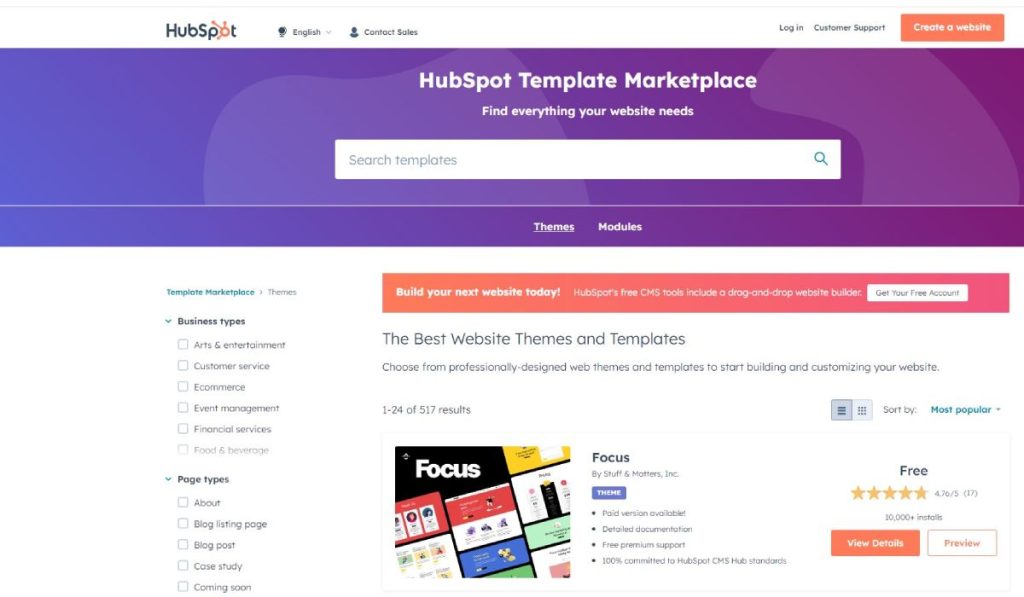
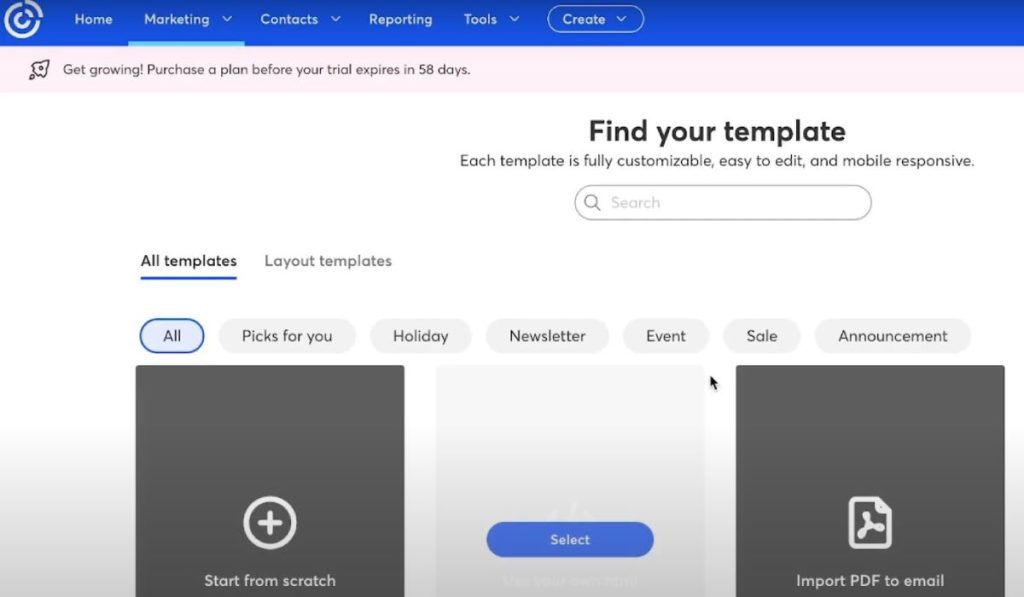
Segmentation and Personalization: Depth vs. Simplicity
Segmentation and personalization capabilities also differ significantly between the two platforms.
- HubSpot: Offers advanced contact segmentation using data from its CRM, allowing for precise targeting based on lifecycle stages and other custom filters. This enables highly targeted and personalized campaigns.
- Constant Contact: Provides basic segmentation capabilities, primarily based on simple attributes like demographics and engagement. While adequate for many small businesses, it lacks the depth and sophistication of HubSpot’s offerings.
Pricing Considerations: Investment vs. Affordability
Pricing is a crucial factor when choosing between these platforms.
Constant Contact: More affordable, especially for small businesses, with straightforward pricing plans that are easier to budget. An attractive option for businesses starting with email marketing or those with limited resources.
HubSpot: Reflects its comprehensive feature set, with plans that scale based on the number of users and features needed. Suitable for medium to large businesses with larger marketing budgets and complex needs.
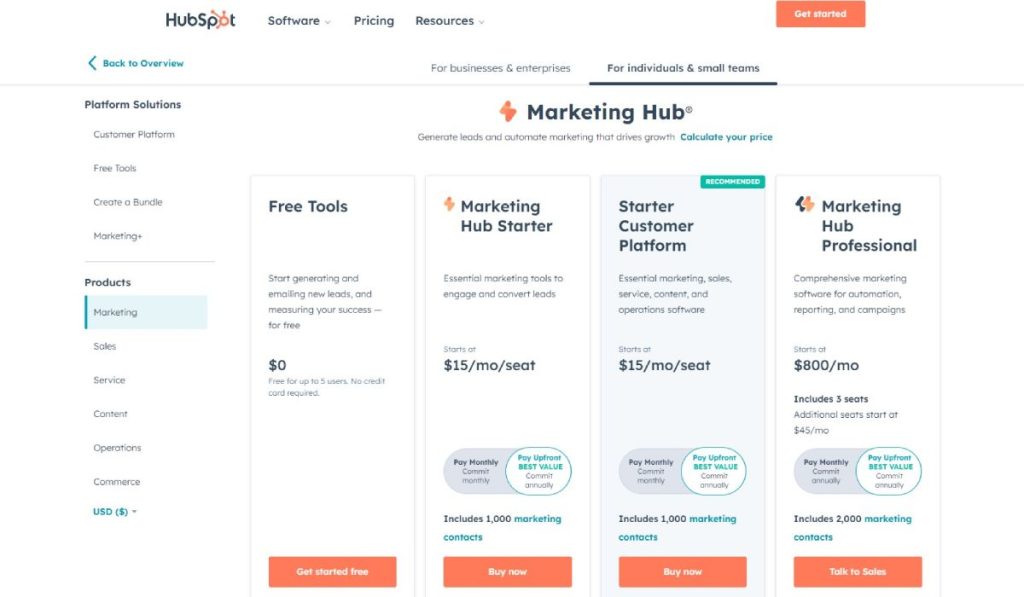
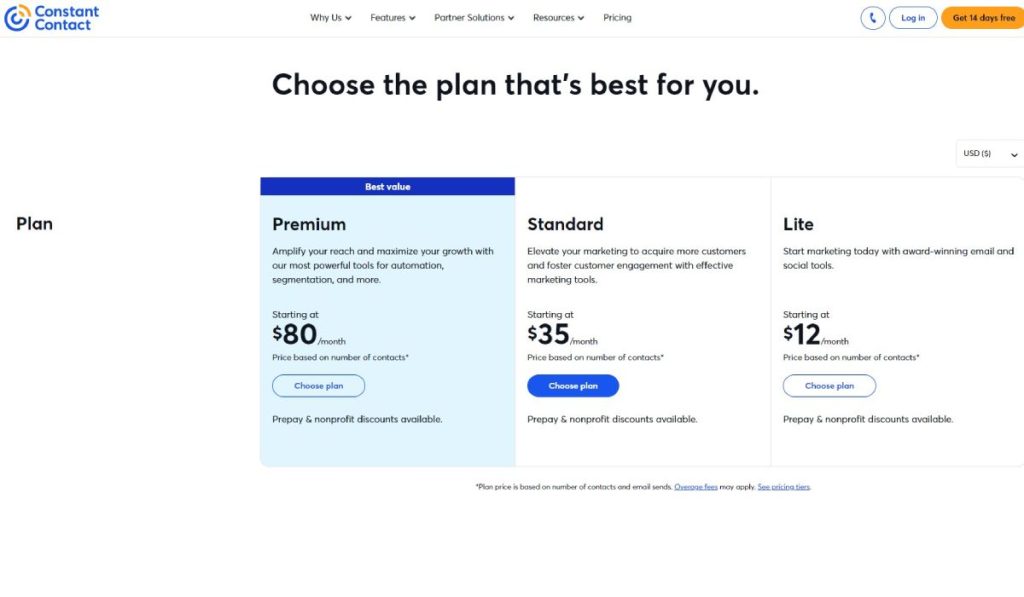
Customer Support: Empowering Users
Both platforms recognize the importance of customer support in ensuring user success.
- HubSpot: Provides email, chat, and phone support (with premium plans), along with extensive training resources through the HubSpot Academy. This comprehensive support system helps users maximize the platform’s potential.
- Constant Contact: Offers strong customer support, including chat and phone assistance, with additional options for paid marketing advisors. This focus on support helps even novice users get up to speed quickly.
Hidden Gems: Unlocking Advanced Strategies in HubSpot
While HubSpot and Constant Contact offer robust email marketing solutions, HubSpot includes several lesser-known features that can significantly enhance your marketing efforts. Here are five hidden gems strategies to unlock the full potential of HubSpot:
1. Leverage HubSpot’s Predictive Lead Scoring
Utilize HubSpot’s machine learning-powered predictive lead scoring to automatically identify high-potential leads. This advanced feature goes beyond basic segmentation, allowing you to focus your efforts on prospects most likely to convert.
2. Implement Multi-Value List Segmentation in HubSpot
Take advantage of HubSpot’s ability to add multiple values to one criteria box in list segmentation. This allows for more complex and precise targeting of your audience, enhancing the effectiveness of your campaigns.
3. Use HubSpot’s Contact Record Email Trigger
Boost sales team efficiency by using the one-click email trigger feature in HubSpot’s contact records. This allows for quick, personalized communication directly from the lead’s profile.
4. Create Dynamic CTAs with HubSpot
Leverage HubSpot’s capability to create personalized, dynamic CTAs that change based on the viewer’s characteristics or behavior. This can significantly increase conversion rates compared to static CTAs.
5. Utilize HubSpot’s Workflow for Data Cleanup
Implement HubSpot’s data cleanup workflow recipe to automatically standardize and clean up contact information. This ensures your database remains accurate and useful for targeted marketing efforts.
By integrating these hidden gems into your HubSpot strategy, you can unlock advanced functionalities that drive better results and streamline your marketing processes.
Innovative Solutions by Prism Reach
While HubSpot and Constant Contact offer powerful email marketing solutions, the landscape is evolving rapidly with the introduction of AI-driven platforms like Prism Reach. Prism Reach stands out by enhancing the effectiveness of email marketing campaigns through deep personalization, transforming how publishers and content creators engage with their audiences.
Benefits of Prism Reach
- Enhanced Personalization through AI: Prism Reach uses sophisticated AI algorithms to customize every aspect of newsletters based on subscriber behavior and preferences, offering a level of personalization that surpasses traditional platforms.
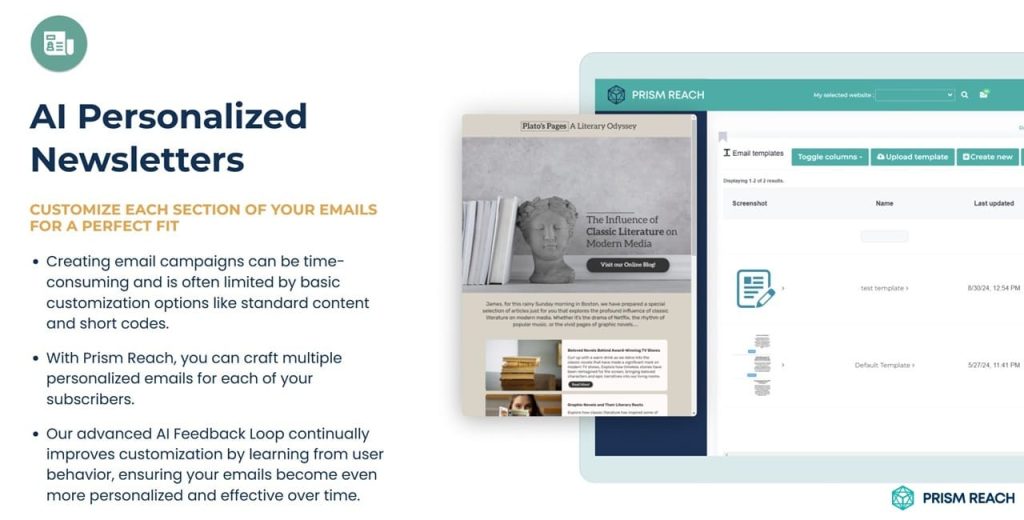
- Increased Engagement and Revenue: Publishers report up to 40% higher engagement rates and higher monetization through tailored advertising and efficient content targeting, leading to increased revenue.
- Seamless Integration with Existing Tools: Prism Reach integrates effortlessly with existing content management systems, CRM tools, and social media platforms, streamlining the newsletter creation and distribution process.
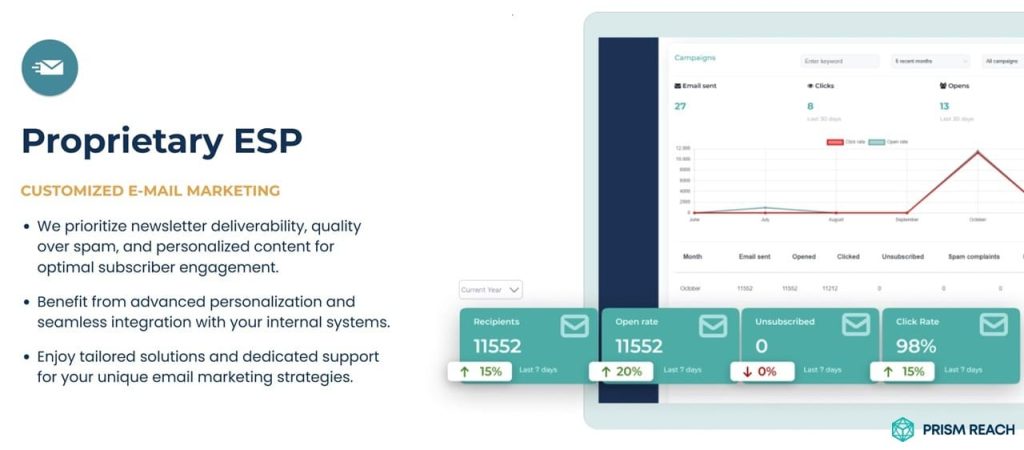
Prism Reach’s AI-powered user avatars and continuous feedback loop enable a level of personalization that goes beyond the segmentation capabilities of both HubSpot and Constant Contact. By analyzing subscriber behavior and preferences, Prism Reach creates unique user journeys for each subscriber, fostering real engagement and nurturing long-lasting relationships.
Additionally, Prism Reach offers seamless integration with existing content, importing all website content and social media posts and organizing them into relevant categories. This automation, combined with AI-driven analytics and predictions, streamlines the newsletter creation process while ensuring highly relevant content for each subscriber.
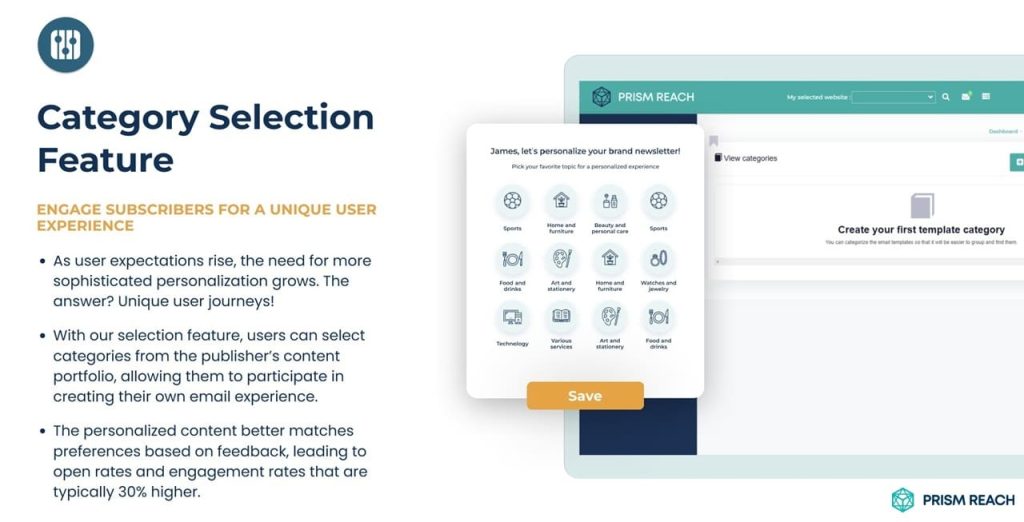
For publishers, blogs, forums, and eCommerce businesses looking to elevate their email marketing, Prism Reach provides a compelling alternative to traditional platforms. Its focus on hyper-personalization and AI-driven insights offers a unique solution for maximizing engagement and revenue through email marketing efforts.
Upgrade Your Email Marketing with AI Personalization!
FAQ
Conclusion
Choosing between HubSpot and Constant Contact ultimately depends on your business size, marketing complexity, and budget. HubSpot offers a comprehensive, all-in-one solution ideal for medium to large businesses with advanced needs, while Constant Contact provides a straightforward, affordable option perfect for small businesses primarily focused on email marketing.
However, as the email marketing landscape evolves, innovative solutions like Prism Reach are pushing the boundaries of personalized customer engagement. By leveraging AI technology to understand and predict subscriber preferences, Prism Reach delivers content that is not only relevant but also timely, enhancing the overall impact of digital marketing campaigns and fostering stronger connections between publishers and their audiences.
When evaluating your email marketing options, consider not only your current needs but also your future growth and the increasing importance of personalization in digital marketing. Whether you choose a comprehensive platform like HubSpot, a straightforward solution like Constant Contact, or an innovative AI-driven approach like Prism Reach, the key is to select a tool that aligns with your business goals and empowers you to connect meaningfully with your audience.